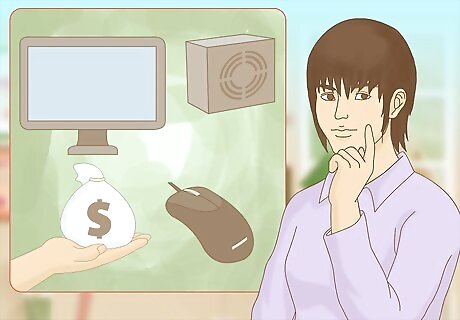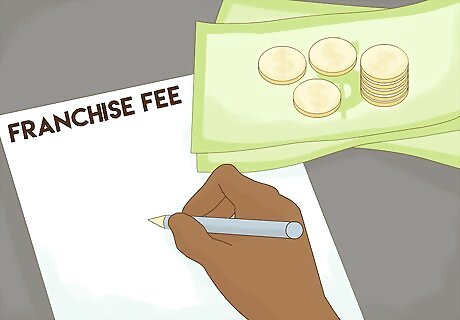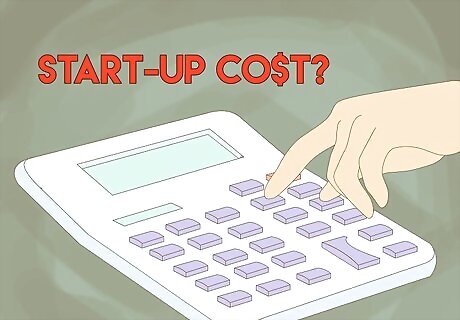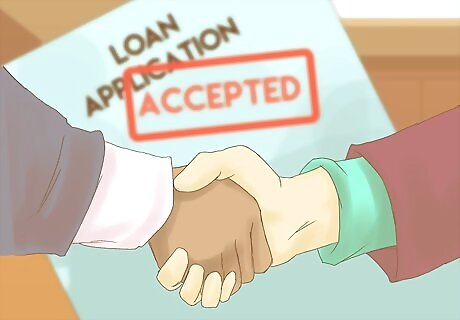
views
X
Research source
Assessing Your Own Skills

Judge your education and experience objectively. Operating a successful franchise not only requires experience in a particular field, but also business operations and management. Without the necessary skills, your business may struggle. Different types of work-at-home franchises will require different skill sets. For example, if you plan to do direct sales on the internet under the branding and marketing of an existing franchise, you probably won't have any staff, so personnel management shouldn't be an issue. On the other hand, if you want to open a home cleaning business and operate it out of your home, you will need to be able to hire, manage, and coordinate several cleaning teams as your business grows. Unless you're looking to change fields entirely, your best bet is to buy a franchise in an industry in which you already have extensive work experience. If you are trying to transition to a different career, focus on areas that require similar skills. Many operational and management skills can be transitioned from one industry to another with a little work. However, this is not the place for ego. It's important to believe in yourself and your abilities, but to avoid getting in over your head you should focus on a franchise that will maximize the skills and experience you have and can objectively prove you have.

Identify your own interests. If the only reason you're interested in a particular franchise opportunity is that you think you'll make lots of money, you may not have the passion necessary to sustain your business and yourself through the lean months. Especially if you're going to be running your business as a one-person show, a work-at-home franchise can be an isolating and lonely endeavor. #*If the work you're doing isn't something you're passionate and excited about, you'll burn out quickly. Distinguish between things you're merely interested in and things you're passionate about. If possible, focus on franchise opportunities that speak to your passion – interest may wane in the face of the grinding work of building your business.

Understand what it means to be your own boss. Buying a franchise means you have a ready-made reputation and brand, but it doesn't mean you can just sit back and watch the money roll in. It takes a lot of work to build a small business, and if you lack the self-discipline and ability to motivate yourself, you may find your business floundering. When you go to work every day, you have a supervisor who evaluates your progress, calls you out when you make a mistake, and keeps you on task. Not having someone looking over your shoulder or depending on you to get work done can be a difficult transition to make. Being your own boss doesn't mean you can do whatever you want whenever you want. What it does mean is that you must be able to objectively evaluate and critique your own performance, keep yourself on task, and learn from past mistakes.

Gauge the resources at your disposal. A franchise isn't exactly a "business in a box." You likely will have to purchase equipment, materials and supplies to get your business off the ground, even if you will be working from home. Resources include knowledge as well as space and equipment. If you've never operated your own business before, look for franchise opportunities that provide a lot of training materials for new franchisees. Consider how quickly you want to build your business and identify your goals in starting the business. For example, if you're a stay-at-home dad who just wants to earn a little money on the side to help your wife with the home finances as well as stay sharp in your field, you may prefer a slow build and not be interested in building your business into a local juggernaut. On the other hand, if you want to quit your day job and operate your work-at-home franchise as your sole source of income, you may need to build your business more quickly, but you'll also need to be efficient and have strong time-management skills. As far as equipment is concerned, look at things you already own that you could convert to business use. For example, if you already have a computer that you could use, that will save you start-up cash because you won't have to buy a new one.
Reviewing Your Finances

Find out the franchise fee. For a work-at-home franchise, the franchise fee itself may be your single largest expense – and often the fee itself is just the beginning as it only gives you the right to use the company's brand and images in your own business. Keep in mind that initial fees for work-at-home franchises often run into the low five figures. If you don't have that kind of money lying around, you're going to have to find a way to finance your purchase. Typically the higher the franchise fee, the more you get for your investment. High-dollar franchises, for example, may come with extensive training or substantial starting packages of products and tools. On the other hand, higher franchise fees often mean you're paying for the brand. This isn't a bad thing, as a well-known and established brand is worth more and you'll find it easier to build your business when you can rely on that brand and reputation. Ultimately, the franchise fee is only a single slice of the start-up pie – even if it is the largest slice. While you should look at the amount of any franchise fee with some skepticism, it all comes down to how much money you're comfortable investing in yourself and your business. Keep in mind that in addition to the up-front franchise fee, you may be responsible for continuing royalties to the franchisor for the use of their trademarks.

Estimate your start-up costs. Any equipment or supplies you don't already have in your possession, you'll have to purchase – and as your business grows, those expenses may grow along with it. Good start-up costs include at least the first year of operation, when you're unlikely to turn a profit. Include in your estimate any classes or training you think you might need to take before you get started, as well as any licenses or permits you may need to get from your city or state before you can start operations. If you plan to hire an accountant for your business, or want to have a lawyer look over the franchise agreement with you before you sign it, their fees also should be factored into your estimate of start-up costs. One of the benefits of a work-at-home franchise is that you may already own much of the equipment and supplies you'll need to get started. However, you may want to consider new office equipment if what you have is several years old or doesn't meet the technical specifications of the franchisor. You also want to include any other personal costs you'll incur as a result of starting a business, such as needing to hire a nanny a few days a week to care for your kids.

Create financial projections. Before you buy a franchise, you need to have a concrete understanding of your monthly expenses and be able to project your cash flow to produce reliable estimates of the income you'll produce in the first years of your business. If you intend to apply for a traditional business loan, you typically will need a full-scale business plan, of which financial projections are only a part. However, even if you have neither the need nor desire to create a detailed business plan, you'll still need financial forecasts to figure out your true start-up costs. Keep in mind that for the first few months of your business, you can't expect to make very much money. Even though your overhead will be relatively low if you're working from home, your first few months of operating expenses still should be accounted for in your start-up costs. You may want to work with an accountant or business consultant if you're unskilled at creating financial projections.

Check out business loans or other financing possibilities. If you don't have significant liquid assets, you may be able to get a business loan to cover a portion of your franchise fees and start-up expenses while you build your business. Conventional wisdom tells you to use your own money or borrow from family or friends, but in many cases this simply isn't an option. While traditional business loans are certainly a way to go, keep in mind lending institutions will require significant information about you and your personal finances before they will approve your application. Micro-lending sites are another way to raise the money that you need. Although they don't tend to have the same stringent requirements as banks and other traditional lending companies, you typically will pay higher interest. Another possibility is to talk to franchisors about financing. Many franchisors offer installment payment programs that allow you to pay the franchise fee over the course of several months rather than paying them all of it up front. Franchisor financing may be a solid option, but keep in mind it may tie your hands if you decide the franchise isn't for you and you want out, and the monthly payments may mean that you realize very little income in your first year of operation.
Understanding the Opportunity

Review the franchise agreement carefully. The franchise agreement – which may be quite lengthy – provides details about exactly what you're buying when you buy the franchise, your duties and responsibilities to the brand and the franchise company, and the basic standards by which you must operate your business. The basic agreement gives you an idea of how much control the franchisor will have over your day-to-day operations and the management of your business. If the level of control goes beyond your comfort level, that might not be the right franchise for you. Make sure the franchisor is ready to substantiate any income projections or profit claims that are made to you while you're evaluating the work-at-home franchise. In addition to the basic agreement, the franchisor is legally obligated to provide you with a disclosure document, which provides you with important information about the current and former franchisees, the business background of the franchise system, as well as the bankruptcy and litigation history of franchise executives. Once you've reviewed all the paperwork, speak to someone in the franchise system and ask any questions you may have. In particular, you want to find out how long they've been in business, how many franchises are currently operating and where they're located, and what types of management or technical assistance the franchisor provides. If you have any questions about supplies, organization, and day-to-day operations, you want to ask these as well. Find out what restrictions there are, particularly in relation to your ability to advertise or promote your business.

Determine how to terminate the agreement. Some franchise agreements have early termination fees and other associated costs if you decide you want to quit before the end of your initial term. You need to know the cost of termination from the outset so you can develop a solid exit strategy. While it's important to have a reliable estimate of your start-up costs, it is perhaps just as important to know how much it will cost if you decide you want to close down your business. Check the term of the original agreement and look for a clause that discusses early termination. You also should review the requirements for renewing your agreement at the end of the term. Some franchisors exercise tremendous discretionary control over whether to approve a renewal.

Research the market in your area. Some franchises may excel in some locations but be doomed to failure in others, whether due to a complete lack of demand or market saturation. The best opportunity is not a good opportunity for you if there's no interest in the products or services you plan to sell. Part of the reason you want to ask the franchisor where current franchises are located is to make sure there aren't too many located near you – this could point to a saturated market. At the same time, if there are no existing franchises anywhere near your county, or even in your state, this could decrease the value to you of the franchise. It's difficult to capitalize on the reputation of an established brand if no one in your area is familiar with it. When researching the market, you don't just want to look at that specific franchise, however – you also want to look at other companies providing the same or similar products or services. These companies will be your competitors, so it's important to find a way that your offerings will stand out as different from theirs, or you'll have a hard time getting your business off the ground.

Talk to people who are already involved. Even if the franchise looks good on paper, you still can learn from the experiences of people who have their own franchises – particularly those who were unable to make the franchise succeed for them. The company may give you the names and contact information of a few people, but you want to search for others as well. Those offered by the company likely are extraordinarily successful franchisors who have already been vetted and prepped by the company to respond to questions in a certain way. This doesn't mean you can't count on someone whose name was given to you by the company to be honest, but it does mean you should treat everything they say with a healthy dash of skepticism.



















Comments
0 comment